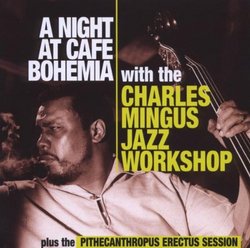Moody, idiosyncratic, experimental, arresting...
Gordon M. Brown | San Diego, CA USA | 03/15/2009
(5 out of 5 stars)
"I had not heard of Giant Steps Records, a British firm, when I happened on this 2-CD set released in January 2009. I was shopping for "Pithecanthropus Erectus" at any rate, and for the nominal introductory price of $13.99 I received that and so much more: nearly 110 minutes of a performance at the Cafe Bohemia, recorded in late December 1955.
The live set is moody, quirky, eccentric, even dry and academic-sounding at times, but ultimately very, very compelling. On this occasion Mingus chose a darker "sound-world" by substituting trombonist Eddie Bert in place of the usual trumpet, and by utilizing on tenor George Barrow, an underrated player whose primary instrument was the baritone sax. Mal Waldron on piano and drummer Willie Jones round out the quintet. On three tracks--"Percussion Discussion," "Drums," and "I'll Remember April"--Max Roach jumps in to replace Jones. Throw on the first disc, and you'll know you're in for something extraordinary as you hear the first of two takes of "Jump Monk," a tune that opens with a jagged, haunting, and highly syncopated solo by Mingus, and quickly erupts into the sort of crazy-fun mayhem that presages "Pithecanthropus Erectus" (which Mingus recorded in the studio with Waldron, Jones, alto Jackie McLean and tenor J. R. Monterose just a month later).
There are many, many high points to be savored here, so I'll just touch on a few: for instance, "Septemberly" juxtaposes drawn-out choruses from "September in the Rain." Another is their take on "All the Things You Are," in which pianist Waldron begins by playing the opening bars of Rachmaninoff's "Prelude in C Sharp Minor, Op. 3 No. 2." The group then superposes the intro made famous by Charlie Parker's "Bird of Paradise" (which contains essentially the same chord progressions as "All the Things..."), right on top of the Rachmaninoff. The result is then cleverly retitled "All the Things You See Sharp." In the Gershwin tune "A Foggy Day," Mingus and trombonist Bert give a foretaste of the sound effects so famously presented on "Pithecanthropus" by bowing and blowing simultaneously, creating a very convincing impression of a foghorn. Not to be overlooked, however, is the 13-minute interpretation of "I'll Remember April" which, though played at just medium-tempo at best, swings, and swings HARD. Barrow and Waldron play to especially good effect on that track.
Moreover, the sound quality of the live set is quite amazing by mid-50s monaural standards: very atmospheric, conveying plenty of depth and "air" around the various instruments. Aesthetics of the packaging are important too, especially with jazz albums, and the Giant Steps package doesn't disappoint. With its dark, sepia-toned photographic elements combined with yellow, black, and white, the packaging evokes a mid-century documentary style that makes me recall fondly my father's days as a press photographer in Los Angeles. (But that's a VERY personal observation; your impressions may vary.)
Because of its rather idiosyncratic nature, "A Night At Cafe Bohemia" may not be to everyone's liking, maybe not even for some (or many) who profess to "love jazz." That said, I believe that if you're seriously investigating the works of Charles Mingus, or you're curious to see how certain cats were experimenting with jazz in the Fifties, this recording will be indispensable. And if you're shopping for "Pithecanthropus Erectus," as I was, don't even hesitate. Snap this thing up before Amazon figures out how much it's really worth!"


 Track Listings (10) - Disc #1
Track Listings (10) - Disc #1